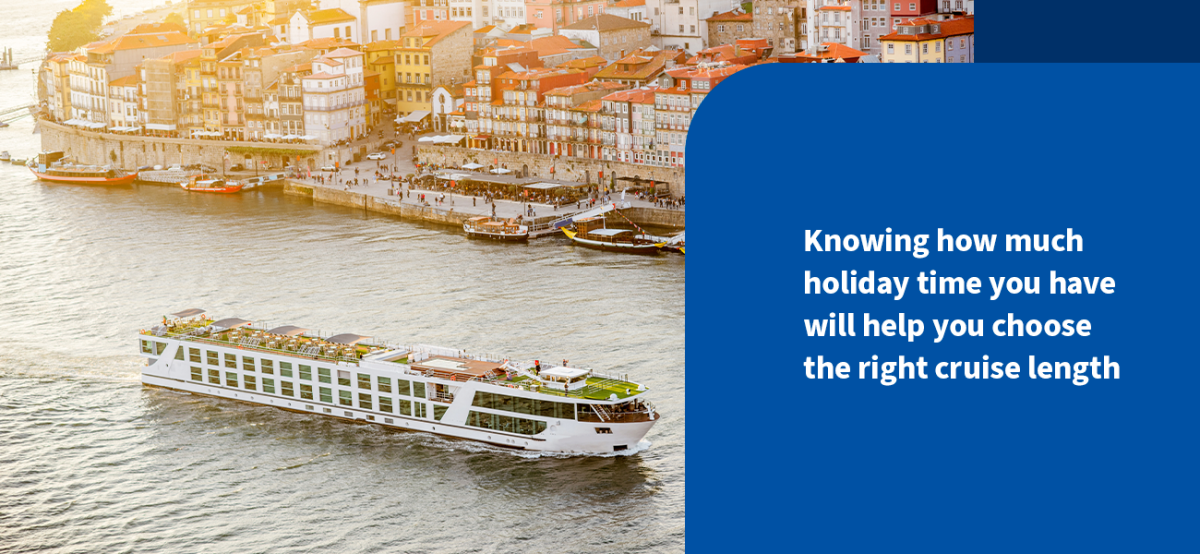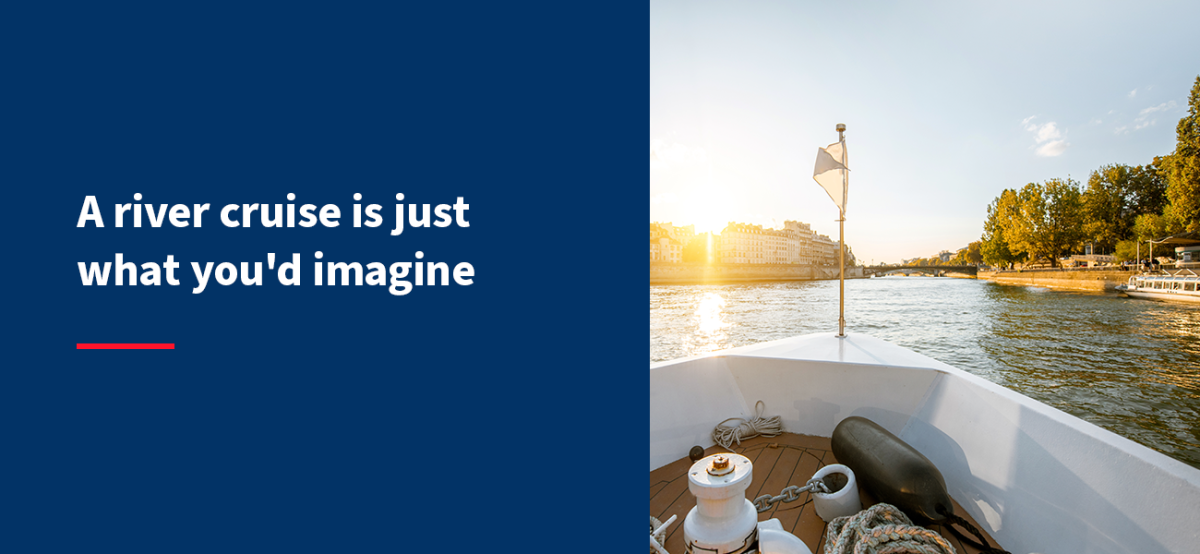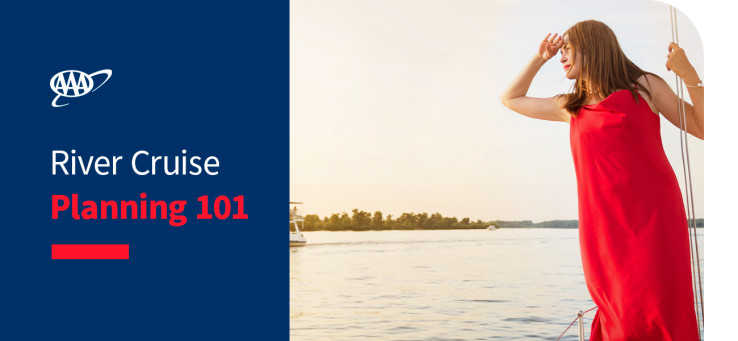River cruises offer a relaxing escape from everyday life and an exciting opportunity to explore multiple destinations. Plus, you only have to unpack once, as your cruise will act as a floating hotel, taking you from one immersive experience to another. They're ideal for first-time cruise-goers and offer a completely different experience than sea cruises.
If you're considering a river cruise for your next holiday, we've loaded this guide with information to help you plan an enjoyable and worry-free cruise along your river of choice.
What Is a River Cruise?
A river cruise is just what you'd imagine — a multiday cruise along a river rather than the sea. River cruises may also sail other inland passages, like lakes and intercoastal waterways. You'll float down waterways at a gentle pace while enjoying the riverside scenery. Most river cruises last a week or more and travel from port to port, often stopping in the heart of towns and cities. You can also choose a cruise that goes through beautiful landscapes to immerse yourself in nature.
A few popular waterways in the United States are the Great Lakes, the Hudson River, the Tennessee River, the Columbia River and the Mississippi River. Internationally, there are even more options, including Europe's Po River, Rhine River and Danube River.
Benefits of River Cruises
Before diving into river cruise planning, it's helpful to learn the benefits of river cruises over sea cruises:
- Multiple stops: River cruises typically make more stops than sea cruises, with less time spent on the water. Depending on the cruise, you may experience a new destination each day, and most of the sailing time happens at night.
- Smaller scale: River cruiseliners are generally smaller and far less grand than sea cruises, making them appealing for travelers focused on the destination rather than the boat. Smaller ships also mean fewer people on board, which leads to a more intimate experience.
- More excursions: With the focus on ports, you'll be out and about far more on a river cruise than a sea cruise. You'll get to do more sightseeing and experience things like wine tastings, museum tours, markets, cafes, hikes, bicycle rides, shops, cooking classes and trips to local theatres. You'll find that most river cruises include daily shore excursions as part of their inclusive packages.
- Local food: River cruises may have fewer restaurants and will typically operate buffet-style, but chefs often use local ingredients they pick up at each stop. This means you can enjoy a range of local cuisine and fresh ingredients in your meals.
- Changing scenery: Instead of the constant views of the ocean, you'll see an ever-changing natural landscape along the shores. You may even see city views if you're cruising through a city waterway. This adds extra interest and visual appeal to your cruise.

River Cruise Planning Guide
Follow the steps below to plan and book your dream river cruise and ensure everything goes smoothly.
1. Outline Your Travel Goals
River cruises offer a large variety of overall themes and activities, and you need to know what's important to you to choose the one you'll enjoy the most. For example, some river cruises focus on cultural immersion, while others offer a chance to be active in nature. Think about the activities you'll love the most, and go from there.
2. Choose a Destination
Next to activities, the cruise route is likely the biggest consideration. You may have a particular destination in mind, whether a specific country, town or a beautiful location you want to visit. Knowing where you want to go and what you want to experience can narrow your options and guide your final choice.
3. Do Some Research
It's difficult to pick the best cruise without knowing the options. Do some research on available cruises in your chosen destination, and have a look at what sets each one apart. You can take notes on things that stand out to you, such as package options, prices, shore excursions and boat amenities. Don't forget to look at some reviews to see what others have experienced.
4. Determine a Time Frame
Knowing how much holiday time you have will help you choose the right cruise length. Shorter cruises can last just a few days, while others extend beyond two weeks. You must also factor in your travel time to the cruise starting point and back.
The time of year will also impact your choice of cruise, as the weather will affect your experience on the water and the scenery and activities available during your trip. Choose a time of year when the weather is pleasant for the best ride, or go when certain season-related attractions — like Christmas markets or spring blooms — are present if that's the goal of your trip.
5. Consider Your Budget
Choosing a cruise is largely based on your available budget. Larger ships, all-inclusive packages, longer trips and specialized services can be more expensive, so assessing your requirements and spending limit can help you choose a cruise line and package. Selecting a smaller cabin closer to the water level and going at a less desirable time of year can help lower your costs if needed.
6. Book Your Cruise
Once you've nailed down all the details, it's time to pick and book your cruise! Compare all the cruise lines against your requirements and choose the ones that offer most of what you want within your budget. This is easier said than done, but you can always make some compromises if one thing in particular is especially important to you.
Don't forget to pre-plan and book your transport to and from the cruise and your accommodation if you plan to stay some extra days at the destination or before you depart. Some cruises offer these as add-ons, making planning a bit easier. You may also need to sign up for certain activities in advance.

7. Prepare for Your Trip
With your cruise booked and paid for, your next step is to get everything ready. Research the weather, itinerary and onboard etiquette to inform your clothing choices, and consider learning more about the local culture and language before you leave. This will help you communicate with locals and better understand the places you're traveling to.
It's also a good idea to get some travel insurance and prepare your documents in advance. Check that your passport is valid for your trip, and acquire a visa if necessary. You may also be able to alert the ship of any dietary requirements so they can prepare for your stay.
Book an Unforgettable River Cruise With AAA Central Penn
While most people think of roadside assistance when they hear AAA, we offer a comprehensive range of other services for members in Central Pennsylvania, including travel planning. Our professional travel advisors are ready and happy to assist you with booking your river cruise, including any other travel and accommodation. They'll guide you through the process and be one phone call away throughout your trip to answer queries and help in emergencies.
You can also book planned trips and cruises through AAA. That way, you can pay one price for a fully curated trip. AAA members get extra benefits, including exclusive packages and discounts, cruise chip credits, priority check-ins and unique experiences. Browse our AAA cruise Discoveries for limited-time offers on pre-planned trips or to find your perfect river cruise package. To enjoy those extra benefits, become a AAA Central Penn member today!

